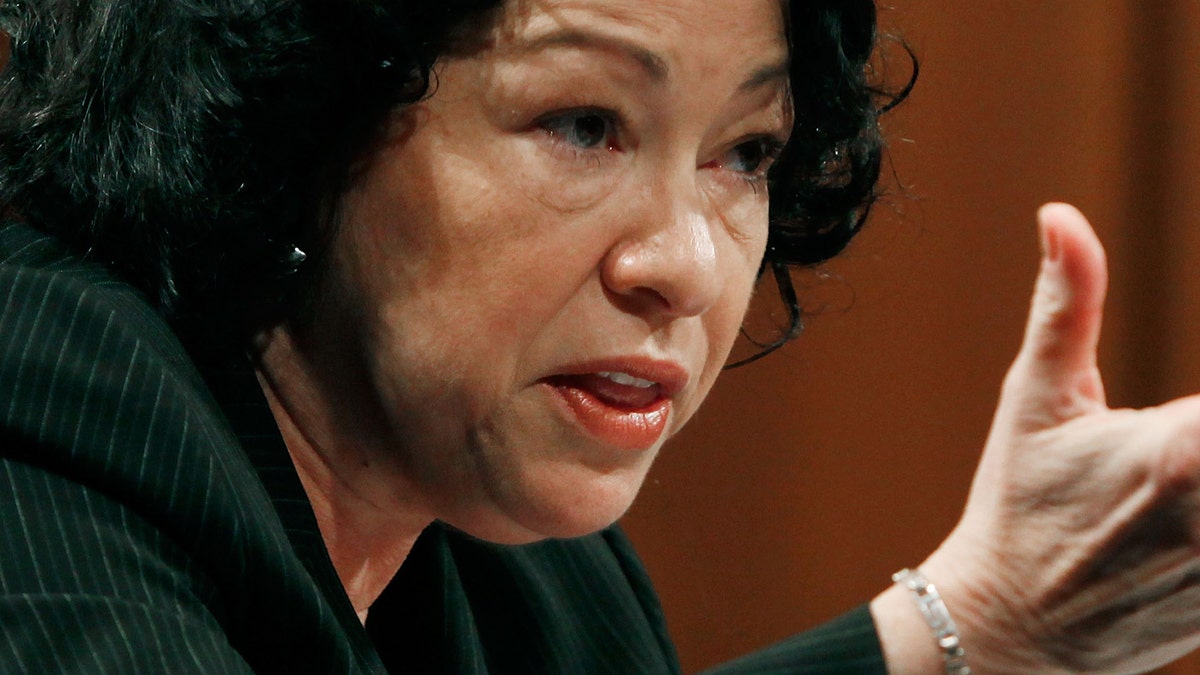
WASHINGTON - JULY 15: Supreme Court nominee Judge Sonia Sotomayor testifies on the third day of confirmation hearings before the Senate Judiciary Committee on Capitol Hill July 15, 2009 in Washington, DC. Sotomayor faces a day of questioning from Senators on the committee and also a closed door session. Sotomayor, an appeals court judge and U.S. President Barack Obama's first Supreme Court nominee, will become the first Hispanic justice on the Supreme Court if confirmed. (Photo by Mark Wilson/Getty Images) *** Local Caption *** Sonia Sotomayor (2009 Getty Images)
Supreme Court Justice Sonia Sotomayor was not happy with the majority’s decision to uphold Michigan’s ban on using race as a factor in college admissions.
And she made sure everyone knew it.
Sotomayor wrote a no-holds-barred dissenting opinion – over 58 pages, longer than the total number of pages written by the four justices in favor of the ban – that, in an unusual move for the High Court, she read aloud from the bench.
Her driving message was that while a key part of democracy is majority rule, the majority sometimes may rule in a way that hurts a minority, and that the minority must sometimes be protected by its government.
Michigan voters in 2006 said race couldn't be used as a factor in the college selection process.
Nearly eight years later, the Supreme Court said the Michigan constitutional amendment will stand. Justice Ruth Ginsberg joined Sotomayor in the dissent.
In her dissent, Sotomayor said, in a pointed fashion largely anchored in the uber-intellectual and scholarly nature of judicial opinions, that her colleagues were failing to grasp the reality of the day-to-day discrimination many minorities face, and have faced throughout U.S. history.
"In my colleagues' view, examining the racial impact of legislation only perpetuates racial discrimination,” Sotomayor said. “This refusal to accept the stark reality that race matters is regrettable. As members of the judiciary tasked with intervening to carry out the guarantee of equal protection, we ought not sit back and wish away, rather than confront, the racial inequality that exists in our society."
Sotomayor, like her colleague, Justice Clarence Thomas, who is African American, has said that affirmative action directly benefitted them, removing barriers to academic and professional opportunities.
"[T]o know the history of our Nation is to understand its long and lamentable record of stymieing the right of racial minorities to participate in the political process," Sotomayor wrote. "The plurality's decision fundamentally misunderstands the nature of the injustice worked by [the Michigan ballot initiative]."
In some parts of her opinion, Sotomayor took direct aim at Justice Antonin Scalia. In other parts, she took on Chief Justice John Roberts, though not by name.
She said her conservative colleagues, on the issues of race, were “out of touch with reality.”
“The way to stop discrimination on the basis of race is to speak openly and candidly on the subject of race, and to apply the Constitution with eyes open to the unfortunate effects of centuries of racial discrimination,” Sotomayor wrote.
“[W]e ought not sit back and wish away, rather than confront, the racial inequality that exists in our society," Sotomayor said. "It is this view that works harm, by perpetuating the facile notion that what makes race matter is acknowledging the simple truth that race does matter.”
"Race matters to a young man’s view of society when he spends his teenage years watching others tense up as he passes, no matter the neighborhood where he grew up," she said. "Race matters to a young woman’s sense of self when she states her hometown, and then is pressed, “No, where are you really from?” regardless of how many generations her family has been in the country."
And, she added, "Race matters to a young person addressed by a stranger in a foreign language, which he does not understand because only English was spoken at home."
Political and judicial experts say not since late Justice Thurgood Marshall has a Supreme Court judge so fiercely spoken in defense of anti-discrimination policies, and culled from their own personal experiences while doing so.
“It’s a really strong dissent, it probably is the most significant opinion Justice Sotomayor has written since she’s been on the court,” said Samuel Bagenstos, a professor at Michigan Law and former official in the civil rights division of the Justice Department, according to MSNBC. “I thought it was a very powerful response, it was important to have someone who clearly is coming from the perspective of having experienced discrimination on the basis of race talk about the reality of the situation.”
Roberts then shot back, though in a more succinct fashion, in an additional opinion submitted in response to Sotomayor.
He took issue with her contention that he was “out of touch with reality.”
“People can disagree in good faith on this issue,” Roberts wrote, “but it similarly does more harm than good to question the openness and candor of those on either side of the debate.”
To read all the justices' opinions, click here.
The Associated Press contributed to this report.




